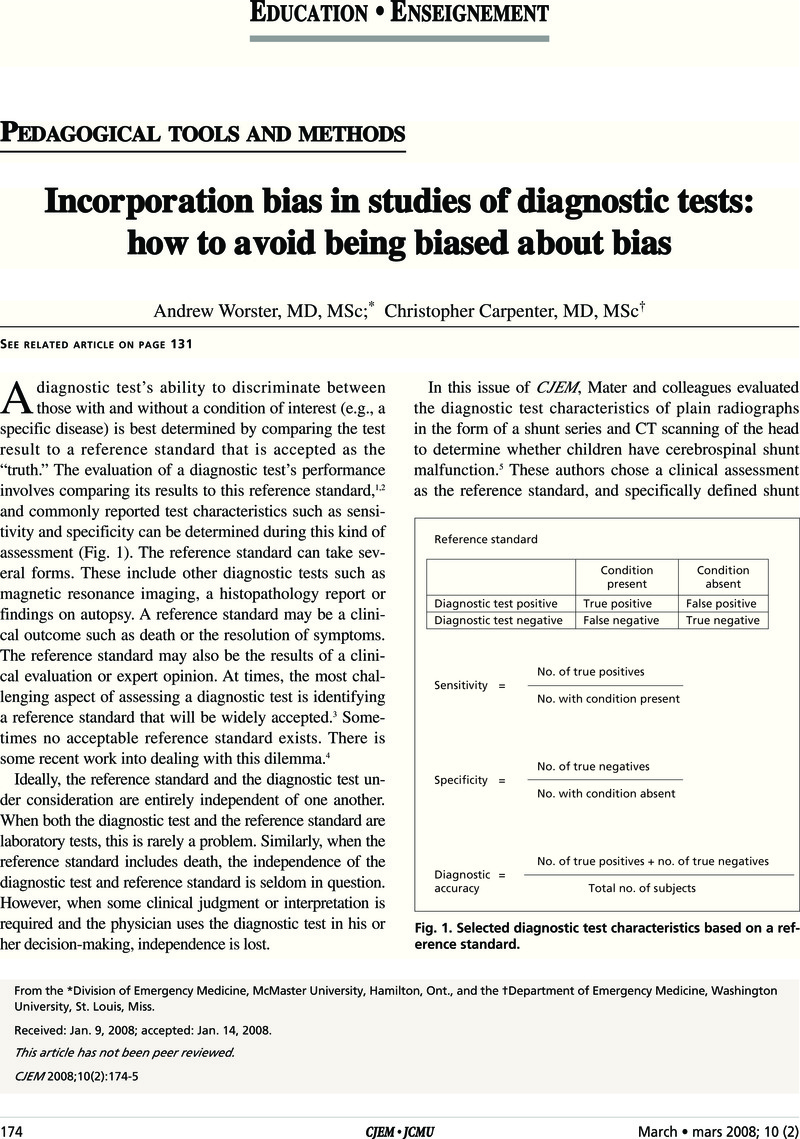Crossref Citations
This article has been cited by the following publications. This list is generated based on data provided by Crossref.
Breidthardt, Tobias
Socrates, Thenral
Drexler, Beatrice
Noveanu, Markus
Heinisch, Corinna
Arenja, Nisha
Klima, Theresia
Züsli, Christina
Reichlin, Tobias
Potocki, Mihael
Twerenbold, Raphael
Steiger, Jürg
and
Mueller, Christian
2012.
Plasma neutrophil gelatinase-associated lipocalin for the prediction of acute kidney injury in acute heart failure.
Critical Care,
Vol. 16,
Issue. 1,
Westphalen, Antonio C.
2012.
Diagnosis of Renal Angiomyolipoma with CT Hounsfield Unit Thresholds.
Radiology,
Vol. 262,
Issue. 1,
p.
370.
Squizzato, Alessandro
Moja, Lorenzo
Ricci, Stefano
and
Gensini, Gian Franco
2012.
Diagnosing acute stroke with magnetic resonance imaging (MRI) calls for caution: computed tomography (CT) is preferable for standard care.
Internal and Emergency Medicine,
Vol. 7,
Issue. 1,
p.
71.
Gambino, Blase
2012.
The Validation of Screening Tests: Meet the New Screen same as the Old Screen?.
Journal of Gambling Studies,
Vol. 28,
Issue. 4,
p.
573.
Marti, Christophe
Garin, Nicolas
Grosgurin, Olivier
Poncet, Antoine
Combescure, Christophe
Carballo, Sebastian
and
Perrier, Arnaud
2012.
Prediction of severe community-acquired pneumonia: a systematic review and meta-analysis.
Critical Care,
Vol. 16,
Issue. 4,
2012.
Evidence‐Based Emergency Care.
p.
54.
Güder, Gülmisal
Brenner, Susanne
Angermann, Christiane E
Ertl, Georg
Held, Matthias
Sachs, Alfred P
Lammers, Jan-Willem
Zanen, Pieter
Hoes, Arno W
Störk, Stefan
and
Rutten, Frans H
2012.
"GOLD or lower limit of normal definition? a comparison with expert-based diagnosis of chronic obstructive pulmonary disease in a prospective cohort-study".
Respiratory Research,
Vol. 13,
Issue. 1,
Kohn, Michael A.
Carpenter, Christopher R.
Newman, Thomas B.
and
Sinert, Richard
2013.
Understanding the Direction of Bias in Studies of Diagnostic Test Accuracy.
Academic Emergency Medicine,
Vol. 20,
Issue. 11,
p.
1194.
Rubano, Elizabeth
Mehta, Ninfa
Caputo, William
Paladino, Lorenzo
Sinert, Richard
and
Carpenter, Christopher
2013.
Systematic Review: Emergency Department Bedside Ultrasonography for Diagnosing Suspected Abdominal Aortic Aneurysm.
Academic Emergency Medicine,
Vol. 20,
Issue. 2,
p.
128.
Carpenter, Christopher R.
Kaphingst, Kimberly A.
Goodman, Melody S.
Lin, Margaret J.
Melson, Andrew T.
Griffey, Richard T.
and
Pines, Jesse
2014.
Feasibility and Diagnostic Accuracy of Brief Health Literacy and Numeracy Screening Instruments in an Urban Emergency Department.
Academic Emergency Medicine,
Vol. 21,
Issue. 2,
p.
137.
Stein, Paul D.
Sostman, H. Dirk
and
Matta, Fadi
2014.
Critical review of SPECT imaging in pulmonary embolism.
Clinical and Translational Imaging,
Vol. 2,
Issue. 5,
p.
379.
Scholte, Johannes B.J.
van Mook, Walther N.K.A.
and
Linssen, Catharina F.M.
2014.
Surveillance cultures in healthcare-associated pneumonia.
Current Opinion in Pulmonary Medicine,
Vol. 20,
Issue. 3,
p.
259.
Willits, Iain
Keltie, Kim
Craig, Joyce
and
Sims, Andrew
2014.
WatchBP Home A for Opportunistically Detecting Atrial Fibrillation During Diagnosis and Monitoring of Hypertension: A NICE Medical Technology Guidance.
Applied Health Economics and Health Policy,
Vol. 12,
Issue. 3,
p.
255.
Thieme, Mai E.
Leeuwenburgh, Marjolein M. N.
Valdehueza, Zaldy D.
Bouman, Donald E.
de Bruin, Ivar G. J. M.
Schreurs, W. Hermien
Houdijk, Alexander P. J.
Stoker, Jaap
and
Wiarda, Bart M.
2014.
Diagnostic accuracy and patient acceptance of MRI in children with suspected appendicitis.
European Radiology,
Vol. 24,
Issue. 3,
p.
630.
Liao, Michael M.
Lezotte, Dennis
Lowenstein, Steven R.
Howard, Kevin
Finley, Zachary
Feng, Zipei
Byyny, Richard L.
Sankoff, Jeffrey D.
Douglas, Ivor S.
and
Haukoos, Jason S.
2014.
Sensitivity of systemic inflammatory response syndrome for critical illness among ED patients.
The American Journal of Emergency Medicine,
Vol. 32,
Issue. 11,
p.
1319.
van Smeden, M.
Naaktgeboren, C. A.
Reitsma, J. B.
Moons, K. G. M.
and
de Groot, J. A. H.
2014.
Latent Class Models in Diagnostic Studies When There is No Reference Standard--A Systematic Review.
American Journal of Epidemiology,
Vol. 179,
Issue. 4,
p.
423.
Carpenter, Christopher R.
Pines, Jesse M.
Schuur, Jeremiah D.
Muir, Meaghan
Calfee, Ryan P.
Raja, Ali S.
and
Kline, Jeffrey A.
2014.
Adult Scaphoid Fracture.
Academic Emergency Medicine,
Vol. 21,
Issue. 2,
p.
101.
Carpenter, Christopher R.
Avidan, Michael S.
Wildes, Tanya
Stark, Susan
Fowler, Susan A.
Lo, Alexander X.
and
Gerson, Lowell
2014.
Predicting Geriatric Falls Following an Episode of Emergency Department Care: A Systematic Review.
Academic Emergency Medicine,
Vol. 21,
Issue. 10,
p.
1069.
Chiesa, Claudio
Pacifico, Lucia
Osborn, John F.
Bonci, Enea
Hofer, Nora
and
Resch, Bernhard
2015.
Early-Onset Neonatal Sepsis.
Medicine,
Vol. 94,
Issue. 30,
p.
e1230.
Bergman, Hanna
Maayan, Nicola
Kirkham, Amanda J
Adams, Clive E
and
Soares-Weiser, Karla
2015.
Schedule for Affective Disorders and Schizophrenia for School-Age Children (K-SADS) for diagnosing schizophrenia in children and adolescents with psychotic symptoms.
Cochrane Database of Systematic Reviews,



